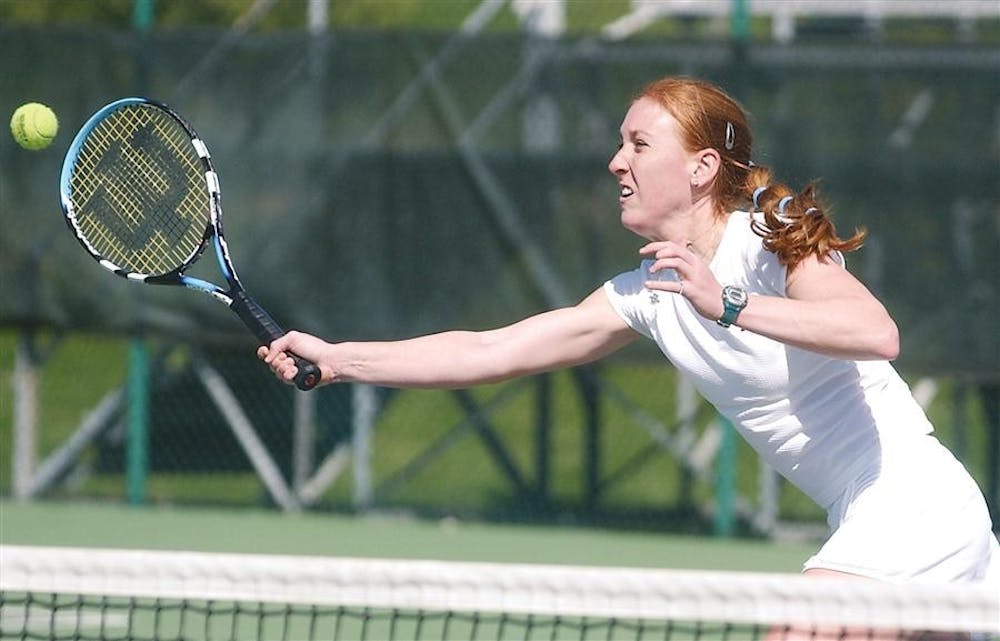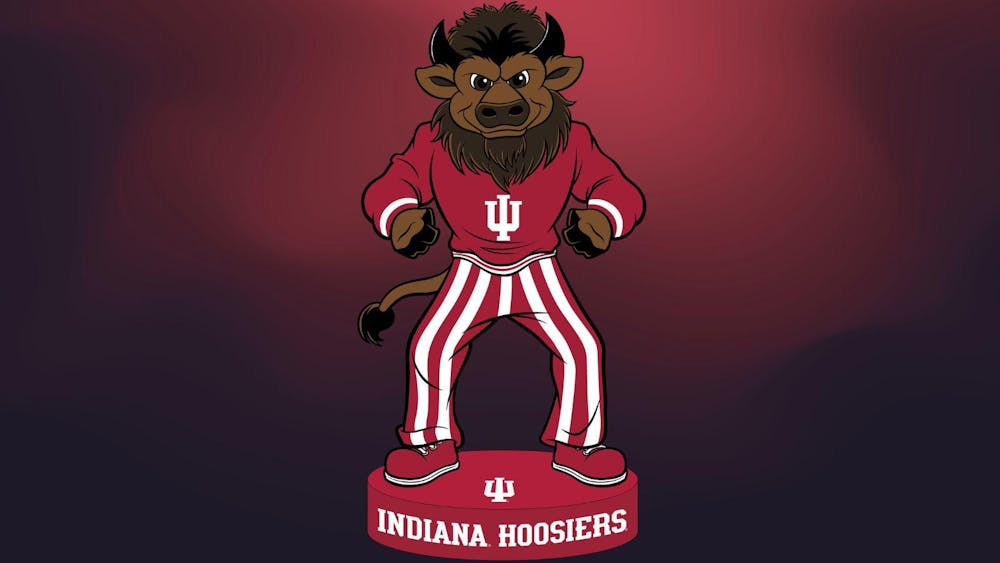The underhand tennis serve traditionally has only factored in instructional lessons for children, but on Feb. 8, 2003, it was the serve that clinched a victory for the IU women’s tennis team in a close 4-3 contest with Marquette.
Karie Schlukebir, senior team captain, had missed the preceding week after a recurrence of melanoma on her arm. Expected to miss an indefinite amount of time, she was only away five days before asking IU coach Lin Loring if she could play in the team’s weekend match against Marquette.
“She told me she was going to play,” Loring said. “She couldn’t lift her arm above chest-high, but she assured me she could win serving underhand. I called (her father) John, who talked to the doctors, who all said if she wants to do it, go for it.”
And she did, splitting the first two sets. Meanwhile, it became increasingly apparent her match would decide which team came away victorious. The Hoosiers held a narrow 3-2 lead, but the remaining match threatened to go to the Eagles at any time. Luckily, Schlukebir took the decisive set 6-2.
“In a script out of the movies, the entire match came down to Karie’s court and the deciding match serving underhand,” Loring said. “As her teammates ran across the court to give her hugs, she just looked over at me and smiled.”
***
Unfortunately, Schlukebir was unable to keep winning her battles, as she lost her fight to melanoma Jan. 16, 2009. She was only 29 years old. She leaves behind a legacy not only as a great tennis player, but also as someone who had an impact on everyone she crossed paths with.
To her college coach, Schlukebir remains the model of the type of athlete he wants to coach.
“Her legacy is the never-give-up attitude that she brought to the team,” Loring said. “She just loved to play, loved her teammates and loved Indiana University and everything about it. She was the perfect Indiana University student-athlete.”
Schlukebir’s memory will be preserved through the Schlukebir Award, a fund created by the IU athletic department. The fund will be used for scholarships, as well as potentially naming a tennis court or facility in her name.
“That would really hit home for her,” Katie Schock, Schlukebir’s sister, said. “Her story will continue. Her love of the game and her legacy and her cancer survivorship for years and years will probably touch more people for years. I think she would be flattered by that.”
***
Born in Kalamazoo, Mich., in 1980, Schlukebir was destined to play tennis. Most of her family, including her two sisters and her mother, Kathy, took up the game and excelled at it.
“I have three daughters who are tennis players,” John Schlukebir said. “It came naturally for her. My wife was a tennis pro and worked at a local tennis facility here in Kalamazoo. She had been a tennis player. It was natural for the girls to play tennis.”
Karie Schlukebir also excelled in softball as a pitcher, but due to overlapping seasons she chose to concentrate solely on tennis when she was 12.
“I had an opportunity to work with (my daughters) myself,” Kathy Schlukebir said. “When they got older, then they found another pro that I thought they worked harder for.”
Kathy Schlukebir believed that playing in tournaments across the country and getting into nationals every year helped Karie Schlukebir develop a national ranking and get her scholarship to IU.
Karie Schlukebir was not originally recruited by IU, as Notre Dame had long held the top spot on her list of schools. But her plans changed when the Irish gave their final scholarship offer to another player.
“She actually recruited us,” Loring said. “She called one day and asked if we had a scholarship left. She had made her five official visits and didn’t really like any of the schools and wanted to know if she could drive down from Michigan for an unofficial visit. She was a good singles player, a good doubles player, a good student and a really nice person who I knew would be a good fit for the team.”
The next year, Karie Schlukebir participated in recruiting from the other side, convincing Linda Tran, a highly recruited player, good friend and former rival, to sign with IU.
“We met when we were about eight or nine years old playing tennis,” Tran said. “We’re both from Michigan. Our coaches were friends so we trained together. ... We would see each other as much as we could, and that’s where we built our friendship.”
Karie Schlukebir and Tran would go on to form one of the most-decorated doubles pairs in school history.
However, Karie Schlukebir was more than just a successful tennis player, serving as team captain for two years and as a member of the 2004 Big Ten Champion team.
“She brought a great attitude, work ethic and was a great teammate to everyone,” Loring said. “She was a great team leader. She had the respect and love of all her teammates. My fondest memories are of how much fun she was to have on the team. She had a great sense of humor and made everyone around her smile. Her attitude and work ethic definitely rubbed off on the team.”
***
Karie Schlukebir got the news early in her freshman season. A biopsy from a removed mole on her shoulder came back positive for Stage 3 melanoma. Her family broke the news to her after an early-season match against Western Michigan in her hometown of Kalamazoo.
“After her match, we brought her over to my dad’s office and told her what the diagnosis was, and that the biopsy had come back,” Schock said. “As Karie always was, she was very calm, never overreacting in any way. Calm, but obviously scared and worried and nervous but also very proactive. She said, ‘What do we do now? What do I do? What’s the action plan?’”
“That’s how she was throughout the whole cancer,” Schock said. “Whether she had good news or bad news, she said, ‘What do we do now?’ If she had good news, it was, ‘What do we do to keep it going?’ If we got bad news, it was, ‘What are we going to do? What’s the plan?’ She was very calm, never panicky, but inside, probably very, very scared.”
The news soon spread to the team as Karie Schlukebir left to begin chemotherapy.
“I was stunned,” Loring said. “You don’t think of that happening to someone so young. My next thought was, ‘How can we help Karie get through this?’”
Karie Schlukebir and the team kept in close contact during her time away, often sending letters and packages and even making the occasional visit.
“I remember when Karie first went to California for treatment for cancer, and she was back home. Lin actually brought the whole tennis team and Karie’s roommate up on the team bus to visit her,” John Schlukebir said. “It was January, and it was nasty weather. They almost got stuck at our house.”
But throughout her battle with cancer in college, Karie Schlukebir always maintained one goal: to get back on the team.
“Tennis was always there, the driving force for her to continue,” Schock said. “She always wanted to come back. There was no questioning her mind while she was going through this that if it was a success, that she was going to come back if all the rules were met. ... As a person, as a sister, as a player, you can’t ask for more than that. It was a no-brainer for her. She wanted to come back. She never gave up. One of her loves is to play.”
***
After Karie Schlukebir’s career at IU ended, she continued to lead an active lifestyle despite her cancer.
“She always liked to stay fit,” Kathy Schlukebir said. “She always ran through high school. She loved working out and staying fit. When she exercised, I think it was a relief from the cancer, which had to always be in her mind. It was an outlet from thinking about that 24/7.”
Tennis also remained a part of Karie Schlukebir’s life as she worked as an assistant coach at Florida International University, until her coaching career was cut short by another recurrence of melanoma.
Before the melanoma returned, Karie Schlukebir trained for and ran in the 2007 Traverse City marathon along with her then-boyfriend and future husband Joe Pennock. Later, in 2009, she had the opportunity to run in the Boston Marathon to raise funds for the Shade Foundation, a nonprofit group seeking to educate children about the dangers of melanoma and sun exposure.
“It takes a lot of discipline, and I think her ultimate goal when running marathons was just to finish,” Schock said. “Not to prove anyone wrong, not to prove that she could do it. Once she finished Traverse City, she got the challenge of running Boston, which is probably one of the hardest, if not the hardest, marathons not only to get into but to finish.”
“Her goal was to finish,” Schock said. “It wasn’t a certain time. It was an internal challenge for her, one to get her mind off of cancer issues. Running can get your mind off things.”
Now that she has died, her family hopes her legacy goes beyond just sports.
The Schlukebir family believes she would also want to be remembered in another way: by people taking better care of their skin, using sunscreen, and visiting the dermatologist.
“She would want people to continue to monitor their skin and make sure things are under control,” Schock said. “I think she’d be happy if she saved one life, and hopefully numerous lives. I think what she would ultimately want is with her unfortunate circumstances, fewer people would be afflicted with melanoma.”
Even for people who already have melanoma, Karie Schlukebir served as proof that one can fight the disease with the right care and attitude.
“It’s hard to explain what your body goes through,” Schock said. “Nobody knows except her. I saw what her body dwindled into. She came back and she accomplished wonderful things.”
Family, friends reflect on life of Karie Schlukebir, former IU tennis player
Family, friends reflect on life of Karie Schlukebir, former IU tennis player

Get stories like this in your inbox
Subscribe





